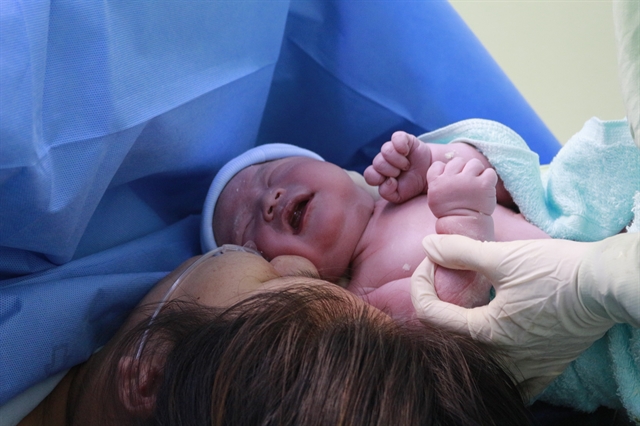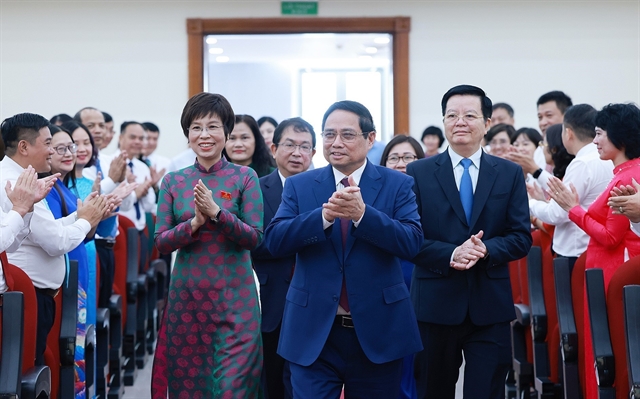 Society
Society


|
| A newborn baby in Cần Thơ City. Việt Nam’s fertility rate is now at its lowest point ever and continues to fall. — VNA/VNS Photo |
HÀ NỘI — The Ministry of Health is drafting a new Population Law to tackle the country’s record-low fertility rates and rapidly ageing population.
The law, expected to be submitted to the National Assembly for approval in October, proposes a series of incentives to encourage childbirth and improve reproductive healthcare.
Under the proposed law, families could benefit from longer maternity leave, cash or in-kind support when having children as well as priority access to social housing and expanded support for prenatal and newborn screening.
There are also targeted measures to support families with two daughters and to reduce the gender imbalance.
The announcement was made on July 11 at a ceremony in Hà Nội marking World Population Day 2025, co-hosted by the Ministry of Health and the United Nations Population Fund (UNFPA). The event also included the release of the 2025 State of World Population Report.
Speaking at the event, Minister of Health Đào Hồng Lan said population policy remains a top priority for the Vietnamese Government. Citing a Party resolution, she reaffirmed that population is seen as a key driver of national development and security.
Vietnamese law already guarantees reproductive rights, allowing individuals and couples to decide when and how many children to have, based on age, health, income and other personal circumstances. Lan called this a clear affirmation of reproductive autonomy.
She noted that Việt Nam has made significant progress in population management. The country has successfully curbed population growth and is currently benefitting from a 'golden population structure' that supports economic development.
Life expectancy has increased to 74.7 years in 2024, well above the global average for countries with similar income levels. Healthcare services for family planning, maternal and child health, and elder care have all improved in recent years.
Despite these gains, Lan acknowledged that Việt Nam is facing major challenges. The country’s fertility rate is now at its lowest point ever and continues to fall. Official data shows the average number of children per woman dropped from 2.01 in 2022 to 1.91 in 2024. At the same time, the population is ageing quickly.
Other concerns include a persistent gender imbalance at birth, teenage pregnancies, early and consanguineous marriages in some regions and health disparities in remote and ethnic community areas. Although average life expectancy is rising, healthy life expectancy remains low, at just around 65 years.
To address these issues, the ministry is also developing a National Target Programme on Health, Population and Development for 2026–2035. The overarching goal is to ensure health, welfare and equality for all citizens, with a people-centered approach to sustainable development.
The draft law includes new provisions to support elder care services and infrastructure, train a new generation of geriatric healthcare workers, require premarital health counselling and checkups and strengthen screening and early diagnosis before and after birth.
Lan called on ministries, local governments and other agencies to continue prioritising population work and to allocate sufficient funding, especially during the ongoing shift to a two-tier local government system. She also urged close coordination in finalising the draft law and national programme.
At the ceremony, UN Resident Coordinator Pauline Tamesis reaffirmed the UN’s support for Việt Nam’s efforts.
She said the UN is committed to helping expand access to quality reproductive healthcare, promote inclusive population policies, deliver age-appropriate sex education and strengthen data systems for better planning.
UNFPA Representative Matt Jackson also spoke at the event, presenting highlights from the global population report. He praised Việt Nam for promoting reproductive rights and stressed that there can be no sustainable development without reproductive autonomy.
He also stressed that empowering individuals to make informed choices would promote gender equality and unlock the full potential of demographic change. — VNS
 Society
Society
 Society
Society
 Society
Society
 Society
Society
 Society
Society
 Society
Society
 Society
Society
 Society
Society
 Society
Society
 Society
Society
 Society
Society
 Society
Society
 Society
Society
 Society
Society
 Society
Society









